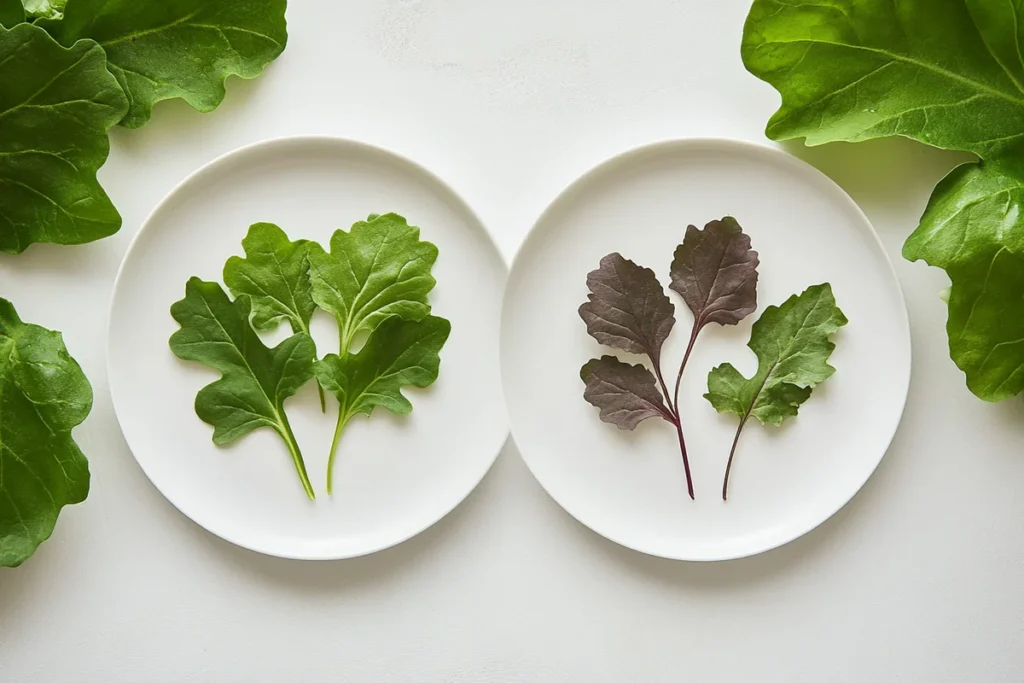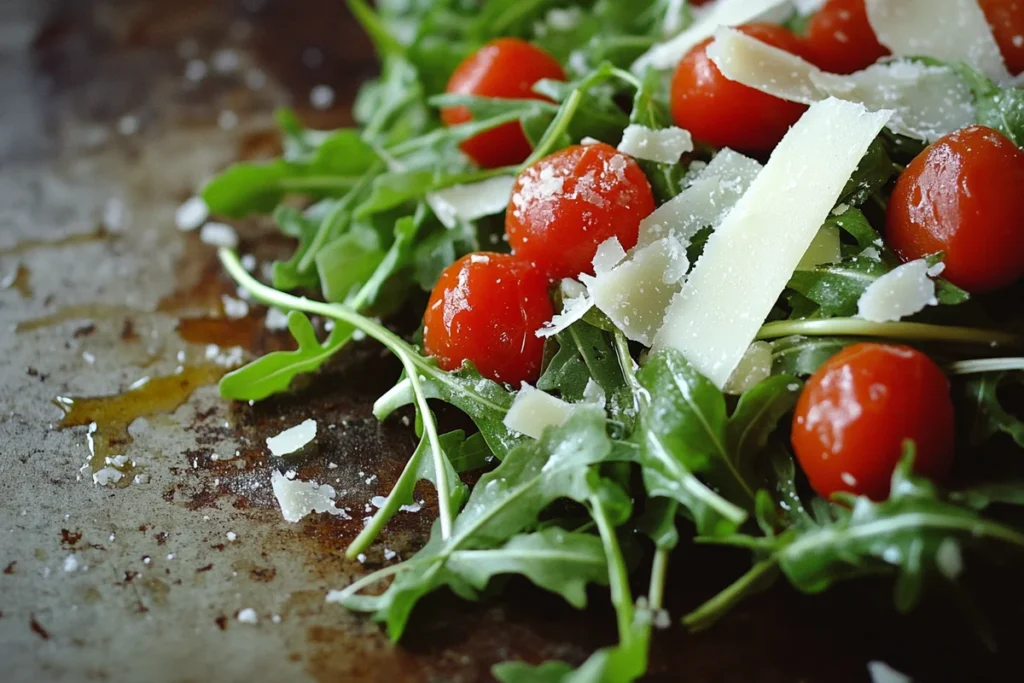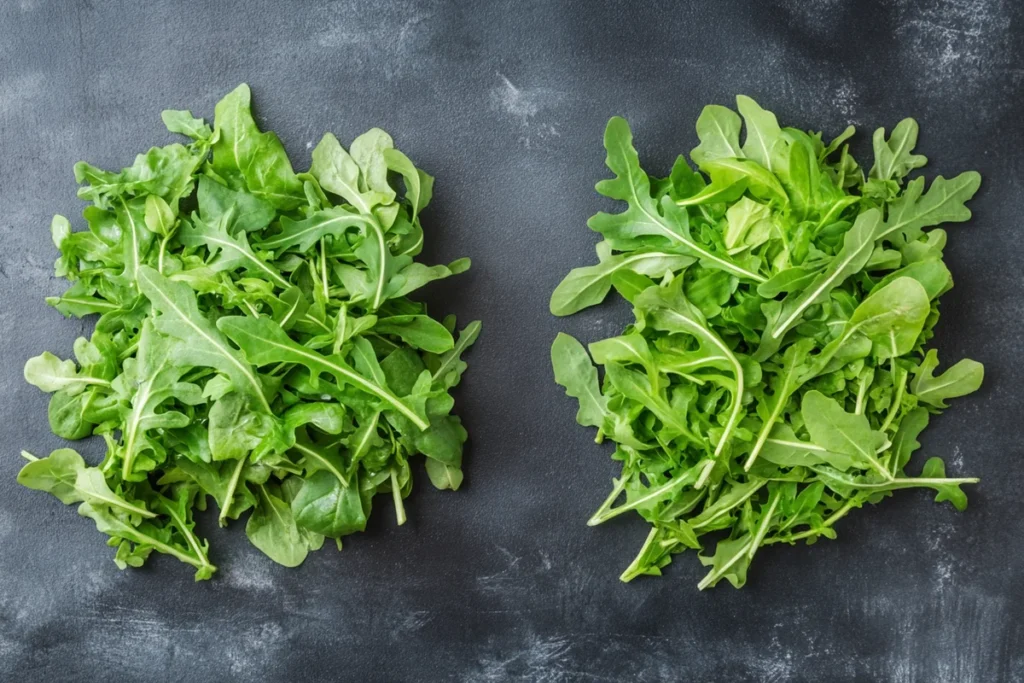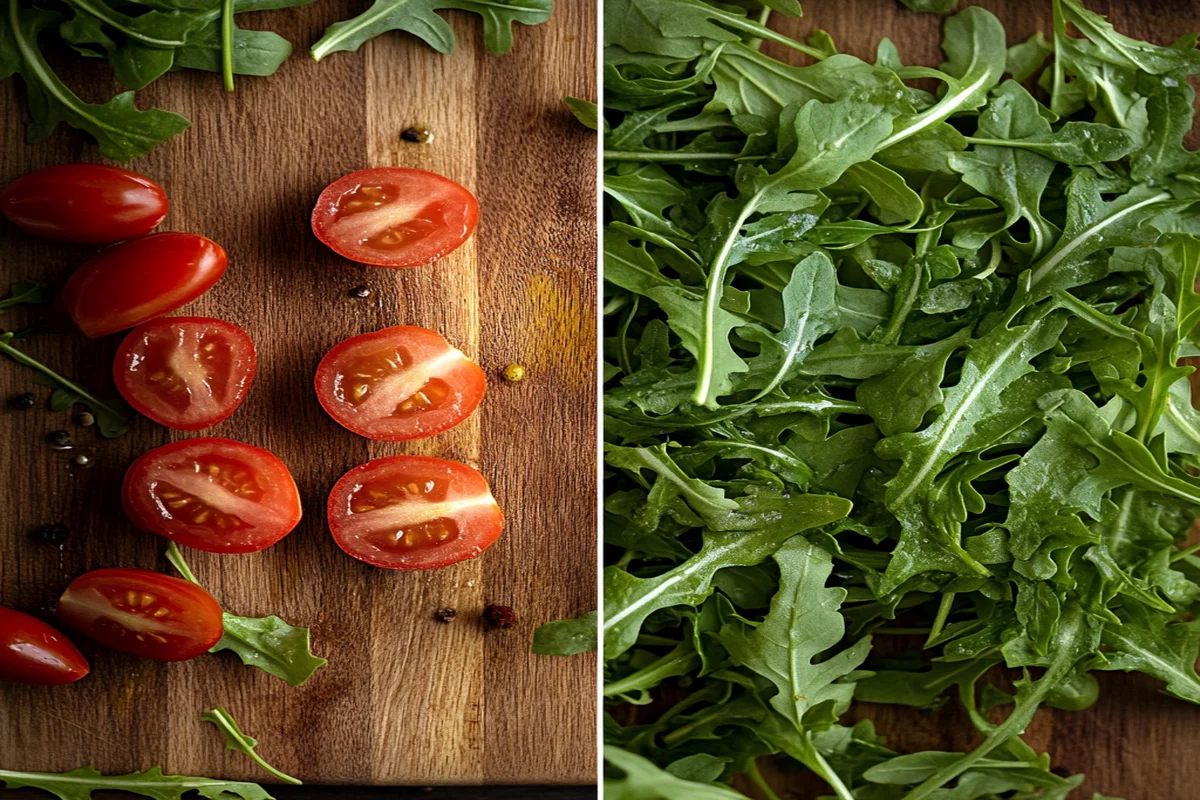Introduction to Rocket Salad and Arugula
What Makes Rocket Salad Special?
Rocket salad, also known as arugula in North America and rucola in Italy, is a leafy green from the Brassicaceae family that has gained global popularity for its bold, peppery flavor and impressive nutritional benefits. Often used in Mediterranean cuisine, this vegetable has been a staple in dishes from Italy to Greece for centuries. But, is rocket salad the same as arugula? Surprisingly, the two terms are often used interchangeably, sparking confusion among food lovers. Rocket salad’s distinctively sharp and nutty taste, along with its jagged green leaves, makes it a vibrant addition to salads, sandwiches, and side dishes worldwide.
Historically, rocket salad was revered as an aphrodisiac in ancient Rome. Today, it’s celebrated not just for its flavor but for its nutrient-rich profile, offering high levels of vitamins K and C, antioxidants, and fiber. Whether tossed into a fresh salad or blended into a spicy pesto, this leafy green is a delicious and healthy choice for many dishes. Keep reading to explore the fascinating connections and subtle differences between rocket salad and arugula, and why they’ve become such iconic ingredients in kitchens around the world.

Key Differences Between Rocket Salad and Arugula
The Botanical Roots of These Leafy Greens
At their core, rocket salad and arugula both belong to the Brassicaceae family, a group that also includes kale, broccoli, and mustard greens. The scientific name of common rocket salad is Eruca vesicaria sativa, while its more pungent cousin, wild rocket, is known as Diplotaxis tenuifolia. Arugula, being another term for rocket, shares the same taxonomy in most cases.
However, the distinction often lies in the varieties. Wild rocket, for instance, has narrower, more deeply lobed leaves and a spicier flavor compared to its cultivated counterpart. This variety is typically sold as “wild arugula” in many markets. Meanwhile, cultivated arugula or rocket tends to have a milder, more approachable peppery taste. Understanding these botanical nuances is key to identifying whether you’re dealing with the same plant or a slightly different strain.
Flavor Profiles That Define Each Green
Here’s where the debate gets interesting. Although rocket salad and arugula come from the same plant family, their taste can vary based on how and where they’re grown. Rocket salad is often described as having a bold, peppery bite with a nutty undertone. This distinct spiciness makes it stand out in salads and garnishes. On the other hand, arugula can range from mildly peppery to intensely zesty, depending on whether it’s a wild or cultivated variety.
Texture also plays a role in distinguishing these greens. Rocket salad leaves tend to be softer and slightly more delicate, while wild arugula leaves are firmer and have a more pronounced crunch. The texture can influence how the greens pair with other ingredients, such as soft cheeses or juicy tomatoes, in your recipes.
How Texture and Appearance Shape Preferences
Visually, rocket salad and arugula share many similarities, but a closer inspection reveals some subtle differences. Rocket salad leaves are typically broader, with rounded lobes and a deep green hue. Meanwhile, wild arugula is easily recognizable by its long, narrow leaves and slightly jagged edges. The color of arugula can also vary slightly, ranging from light green to a darker shade, depending on the growing conditions and age of the plant.
Interestingly, younger leaves of both rocket salad and arugula tend to be milder in flavor, while mature leaves are spicier and more robust. So, when deciding which one to use in your dish, consider not just the appearance but also the intensity of flavor you want to achieve.
Comparing Their Nutritional Value
From a nutritional standpoint, both rocket salad and arugula are powerhouses of health. They’re low in calories but high in essential nutrients, making them a fantastic addition to any diet. These greens are rich in vitamins A, C, and K, as well as calcium, potassium, and folate.
Rocket salad is particularly prized for its antioxidant properties, which help combat oxidative stress and support overall health. Arugula, too, shines in this regard, with studies highlighting its ability to boost immunity and reduce inflammation. Additionally, arugula contains glucosinolates – natural compounds that may help protect against certain types of cancer.
When it comes to comparing their nutritional profiles side by side, the differences are minor. However, if you’re seeking a more intense dose of antioxidants, wild arugula may have a slight edge over cultivated rocket salad.
The Verdict on Differences
So, is rocket salad the same as arugula? Botanically speaking, yes – but regional naming conventions, flavor intensities, and visual traits can create perceived distinctions. While some culinary enthusiasts might insist on separating the two, the reality is that they’re close relatives with only subtle differences. Whether you prefer the milder notes of cultivated rocket or the fiery kick of wild arugula, both are excellent choices for adding a peppery punch to your meals.
Rocket Salad and Arugula in Cooking
Creative Ways to Use Rocket Salad in Cooking
Rocket salad is a versatile leafy green that shines in a variety of dishes. Its peppery flavor can elevate the simplest of meals, transforming an ordinary salad into something bold and exciting. Mediterranean cuisines, especially Italian and Greek, have long embraced rocket salad for its distinct taste and vibrant texture. Tossed with olive oil, lemon juice, and shaved Parmesan, rocket salad creates a refreshing side dish that complements everything from grilled vegetables to roasted chicken.
You’ll also find rocket salad used as a garnish for hearty soups, where its sharp taste balances the richness of the broth. It’s equally popular in sandwiches and wraps, where its crispness adds a satisfying bite. And let’s not forget its role in pasta – stirred into warm spaghetti with garlic and chili flakes, rocket salad creates a quick, healthy meal that’s packed with flavor.
For adventurous cooks, rocket salad can even be used in unconventional ways. Blend it into pesto for a spicy twist, or use it to top flatbreads and homemade pizzas for a sophisticated touch. The possibilities are endless when you let this bold green steal the spotlight in your kitchen.
Arugula’s Role in Iconic Recipes
Arugula, often synonymous with rocket salad, is another culinary star. Its slightly milder and more delicate flavor makes it a favorite in salads, where it pairs beautifully with ingredients like cherry tomatoes, avocados, and nuts. In Italian cuisine, arugula often graces the top of pizzas fresh out of the oven, adding a burst of color and peppery freshness.
One of the reasons arugula is so beloved is its ability to complement both light and rich dishes. For example, it can be tossed with citrus fruits and vinaigrettes for a refreshing summer salad or mixed with creamy dressings for a heartier meal. You’ll also find arugula in grain bowls, blended into smoothies, or sautéed as a side dish. Its versatility makes it a staple ingredient for home cooks and professional chefs alike.
Moreover, arugula’s tender leaves are excellent for creating wraps or stuffing. For instance, wrap arugula with smoked turkey or roasted vegetables for a quick, healthy lunch. Whether eaten raw or slightly wilted, arugula’s unique flavor profile ensures it never gets lost among other ingredients.

Can You Substitute Rocket Salad and Arugula?
If you’ve ever run out of rocket salad or arugula mid-recipe, you may have wondered if the two can be used interchangeably. The short answer is: yes, but with some caveats. Rocket salad and arugula are nearly identical in taste and texture, so substituting one for the other generally works well.
However, if a recipe calls specifically for wild arugula, substituting it with regular rocket might result in a less spicy dish. Wild arugula’s robust flavor profile is better suited for dishes that need a strong peppery kick, such as a pesto or salad with bold ingredients like blue cheese or walnuts.
If neither rocket salad nor arugula is available, other peppery greens like watercress, mizuna, or even dandelion greens can step in as substitutes. These greens bring their own unique flavors to the table, so while the dish might taste slightly different, it will still be delicious.
Whether you’re crafting a salad, cooking a pasta dish, or layering ingredients for a sandwich, rocket salad and arugula both bring a touch of vibrancy that enhances the overall flavor profile. The ability to swap them out in most recipes makes them a go-to option for anyone who loves peppery greens.
Growing Rocket Salad vs Arugula
Tips for Growing Rocket Salad Successfully
Rocket salad is a gardener’s delight due to its ease of cultivation and quick growth cycle. This leafy green thrives in cool weather and can be planted in both spring and fall for optimal yields. Rocket salad grows best in well-draining soil that is rich in organic matter. If you’re starting from seeds, you’ll notice germination occurs quickly – usually within 5 to 10 days.
The ideal conditions for rocket salad include full sun to partial shade, although it prefers cooler temperatures. When grown in hot weather, rocket salad tends to bolt (flower prematurely), which can make the leaves taste more bitter. To avoid this, stagger your plantings every two weeks during the growing season to ensure a continuous harvest of tender, flavorful leaves.
Harvesting rocket salad is simple – just pick the outer leaves when they reach about 3-4 inches long. This encourages the plant to produce more leaves, extending the harvest period. Because rocket salad grows so quickly, it’s a fantastic choice for home gardeners looking to enjoy fresh greens within a matter of weeks.
How to Nurture Arugula in Any Garden
Like rocket salad, arugula is a cool-weather crop that thrives in similar conditions. This leafy green is incredibly adaptable and can even grow in containers or small garden spaces, making it a favorite for urban gardeners. Arugula prefers loose, fertile soil with a slightly acidic to neutral pH (around 6.0 to 7.0) and requires consistent moisture for healthy growth.
Planting arugula seeds directly into the soil works best, as they germinate quickly, just like rocket salad. Arugula can tolerate partial shade but flourishes in sunny spots with moderate temperatures. If grown in overly hot conditions, arugula, too, will bolt, resulting in spicier, more pungent leaves. While this isn’t necessarily a bad thing for flavor enthusiasts, it can make the greens too strong for some palates.
One advantage of growing arugula is its hardiness. It can handle a light frost and continues to produce well into late autumn in temperate climates. To harvest arugula, simply snip off the leaves when they’re about 2-3 inches long. Like rocket salad, regular harvesting helps the plant produce more leaves, giving you a steady supply of fresh greens.
Which Is the Better Option for Beginner Gardeners?
So, is rocket salad easier to grow than arugula, or are they equally beginner-friendly? Both greens are incredibly low-maintenance, making them ideal for first-time gardeners or anyone who wants to grow fresh produce with minimal effort. However, there are a few factors to consider:
- Climate Sensitivity: Both rocket salad and arugula prefer cool weather, but arugula tends to be slightly more tolerant of frost, which might give it an edge for those in colder regions.
- Growth Speed: Rocket salad grows marginally faster than arugula, which means you can enjoy your harvest a bit sooner.
- Flavor Control: If you’re growing for taste, be mindful of bolting. Rocket salad might develop bitterness quicker in hot weather, while arugula tends to maintain its flavor a little longer.
Ultimately, the choice comes down to personal preference and growing conditions. Both greens are fantastic additions to your garden, offering not only quick results but also a reliable source of nutritious, peppery greens.
Health Benefits of Rocket Salad and Arugula
Why Rocket Salad is a Nutritional Powerhouse
Rocket salad isn’t just about bold flavors; it’s a treasure trove of nutrients that can supercharge your health. One of the standout features of rocket salad is its impressive vitamin K content, which plays a vital role in bone health and blood clotting. Adding a handful of rocket to your meals can help maintain strong bones and reduce the risk of osteoporosis.
This leafy green is also rich in vitamin C, a powerful antioxidant that strengthens the immune system and promotes glowing skin. Its high levels of folate, an essential B-vitamin, make it an excellent choice for pregnant women, as folate supports fetal development and reduces the risk of birth defects.
Additionally, rocket salad contains compounds known as glucosinolates, which may help reduce the risk of certain cancers. These compounds are converted into isothiocyanates when you chew or chop the leaves, which have been linked to detoxification and anti-inflammatory effects in the body. Whether you toss it in salads or blend it into smoothies, rocket salad is a nutrient-packed green that supports overall wellness.
Arugula’s Benefits for Health and Wellness
Arugula holds its own when it comes to health benefits, boasting a similar nutritional profile to rocket salad. Like its counterpart, arugula is a fantastic source of antioxidants that help combat free radicals, reducing oxidative stress and inflammation in the body. It’s also rich in calcium, which is crucial for maintaining healthy teeth and bones.
One of the unique benefits of arugula is its ability to support cardiovascular health. Thanks to its nitrate content, arugula may help improve blood flow and lower blood pressure. Studies suggest that dietary nitrates can enhance athletic performance by boosting oxygen delivery to muscles, making arugula a great choice for fitness enthusiasts.
Arugula is also packed with iron, magnesium, and potassium, which contribute to energy production, muscle function, and heart health. And let’s not overlook its low-calorie nature – a cup of arugula contains fewer than 10 calories, making it an ideal choice for those looking to manage their weight without sacrificing nutrition.

Superfood Status: Do Both Greens Qualify?
While the term “superfood” gets thrown around a lot, rocket salad and arugula truly deserve the title. Their nutrient density, combined with their ability to enhance the flavor of dishes, makes them a powerful addition to any diet. Whether you’re looking to boost your immune system, improve digestion, or support heart health, these greens deliver on all fronts.
Both rocket salad and arugula are excellent sources of dietary fiber, which promotes gut health by feeding beneficial gut bacteria. Additionally, their high water content helps keep you hydrated and supports healthy skin.
While they share many of the same benefits, wild arugula’s more intense flavor is often associated with higher levels of glucosinolates, giving it a slight edge in terms of cancer-fighting properties. However, whether you choose rocket salad, arugula, or both, you’re incorporating nutrient-rich foods that contribute to a healthier lifestyle.
FAQs About Rocket Salad and Arugula
Is Rocket Salad the Same as Arugula?
Yes, rocket salad and arugula are essentially the same plant, known botanically as Eruca vesicaria. The key difference lies in their regional naming conventions: in the UK, Australia, and much of Europe, it’s commonly called “rocket,” while in North America, it’s referred to as “arugula.” However, slight variations in taste, texture, and appearance can arise depending on whether you’re dealing with wild arugula or cultivated rocket salad. Despite these nuances, they are largely interchangeable in recipes.
What is Rocket Salad Good For?
Rocket salad is excellent for adding a peppery kick to salads, sandwiches, pastas, and pizzas. Beyond its culinary versatility, it’s packed with nutrients like vitamins K and C, folate, and antioxidants. These nutrients support bone health, boost immunity, and help combat inflammation. Its high fiber content also aids digestion and promotes gut health. Whether eaten raw, sautéed, or blended into sauces, rocket salad is a flavorful way to enhance your meals and improve your overall health.
Is Arugula and Rocket Salad Good for Weight Loss?
Absolutely! Both arugula and rocket salad are low in calories, with just 5-10 calories per cup, making them perfect for weight management. They’re also high in water content and fiber, which help you feel full longer while promoting hydration. Their rich nutrient profiles ensure you’re fueling your body with essential vitamins and minerals without adding unnecessary calories. Incorporate these greens into your meals to add flavor and nutrition while keeping your calorie count in check.
Can You Grow Rocket Salad and Arugula Indoors?
Yes, growing rocket salad and arugula indoors is entirely possible! These greens are perfect for container gardening, as they don’t require much space or effort. Simply place a shallow container with well-draining soil in a sunny spot, plant the seeds, and keep the soil moist. Within a few weeks, you’ll have fresh, peppery greens ready for harvest. This makes them a fantastic option for urban gardeners or anyone looking to have fresh greens year-round.
What is Another Name for Rocket Salad?
Rocket salad is known by several names depending on where you are in the world. In addition to “arugula” in North America, it’s also called “roquette” in French-speaking regions and “rucola” in Italy. In some places, especially in older English texts, it’s referred to as “garden rocket.” These alternative names often reflect regional languages and culinary traditions, but they all point to the same peppery, flavorful green.
How Do You Know if Arugula is Fresh?
Fresh arugula has bright green, firm leaves with no yellowing or wilting. The leaves should feel crisp to the touch and have a mild, slightly spicy aroma. Avoid arugula that looks slimy, has black spots, or feels mushy, as these are signs of spoilage. To keep it fresh, store arugula in the refrigerator, ideally in a loose plastic bag or container with a paper towel to absorb excess moisture. Properly stored, arugula can stay fresh for up to a week.
Conclusion
Should You Choose Rocket Salad or Arugula?
Rocket salad and arugula, though often used interchangeably, are essentially two names for the same leafy green. Their differences are more about regional terminology and slight variations in taste, texture, and appearance depending on how they’re grown. Rocket salad, widely known in Europe and Australia, and arugula, the term favored in North America, both belong to the same botanical family (Eruca vesicaria). While cultivated varieties tend to be milder and more tender, wild arugula offers a spicier, sharper flavor with narrower leaves.
When it comes to their culinary and nutritional value, rocket salad and arugula are true powerhouses. They bring a peppery punch to salads, pastas, and sandwiches, while packing an abundance of nutrients like vitamins K and C, folate, and antioxidants. Whether you’re looking to enhance your meals with bold flavors or supercharge your diet with nutrient-rich greens, both options are fantastic choices.
Embracing the Best of Both Greens
So, is rocket salad the same as arugula? Technically, yes – they are different names for the same plant with only minor distinctions. Whether you call it rocket or arugula, this leafy green deserves a spot in your kitchen for its versatility, nutrition, and robust flavor. It’s a culinary chameleon, enhancing dishes from salads to soups to sauces, and a nutritional powerhouse that supports overall health.
Why not experiment with both? Try growing them at home, adding them to different recipes, or even blending them into a spicy pesto. No matter how you enjoy them, rocket salad and arugula will surely add zest and vibrancy to your meals. Now that you know the truth, you can confidently shop for or grow these greens without second-guessing their identity. Happy cooking – and eating!
This concludes the article. Let me know if there’s anything else you’d like to refine! 😊

